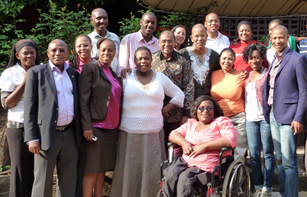
Feature Story
Civil society in South Africa pushing beyond the status quo
30 September 2011
30 September 2011 30 September 2011
Credit: UNAIDS
“What’s in a name?” asked Yvette Raphael during a meeting with representatives from more than 15 civil society networks in South Africa and the UNAIDS Executive Director. Ms Raphael was talking about the challenges faced by civil society and networks of people living with HIV. She brought up how sometimes something as basic as a “name” or how people talk about HIV can be obstacles to services and life. Ms Raphael gave examples of clinics with depressing names no one wanted to go into and even some of the names given to children living with HIV. “I mean, who wants to marry ‘Sadness’,” she said. “We need to normalize the language and terminology we use when we talk about AIDS.”
Mpho Moteble, a university student lamented the fact that HIV and other health services are not available at her school. While students can get an HIV test and counselling, they can’t get HIV treatment on campus or a pap smear for cervical cancer screening. For these services she must go to a general clinic where she says she isn’t with her peers and it can be very uncomfortable, “I don’t want to see my aunt at the clinic—and have her ask me, aren’t you supposed to be at school?” Ms Moteble said far too few campus clinics offer integrated services, making it difficult for busy students to follow through.
Civil society groups raised many of the difficult issues facing South Africa, from getting services to people with disabilities living with HIV, hate crimes and violence against women to discordant couples. Another important issue raised was how the country will approach HIV treatment options in the near future when first-line antiretroviral treatment is no longer effective.
UNAIDS stands in solidarity with you and we will continue to mobilize for the change we all want to see happen
UNAIDS Executive Director Michel Sidibé
Johanna Ncala was one of many who raised the point of how people living with HIV can contribute to HIV prevention efforts. She also talked about daily life and how difficult it can be to disclose one’s status or to always use condoms. Another participant mentioned that while adults have support groups for sharing life experiences, she is seeing a new generation of adolescents born with HIV that are growing up without the life skills and knowledge needed to effectively engage in a relationship.
Pholokgolo Ramothwala from Positive Convention moderated the discussion. He noted that much progress had been seen in the last few years and that has re-energized groups to push for more action on these tough issues.
UNAIDS Executive Director Michel Sidibé echoed this theme of not shying away from the complex areas. “You are all agents of change,” he said. “UNAIDS stands in solidarity with you and we will continue to mobilize for the change we all want to see happen.”



